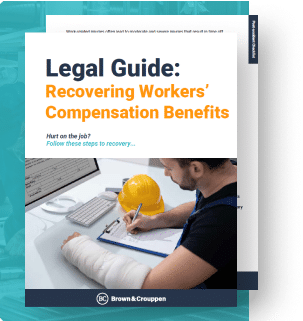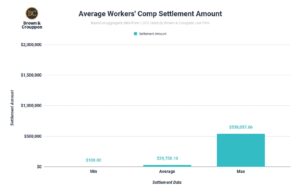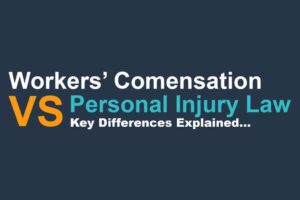
Use our guide to make a full recovery, understand the workers’ comp process, and learn about key legal considerations regarding your claim.
About Missouri Workers’ Compensation Statute of Limitations
No one expects to get injured in the workplace, yet workplace-related injuries occur every day. The United States Bureau of Labor Statistics (BLS) regularly collects data on workplace injuries and illnesses. According to their statistics for 2021, there were approximately 2.6 million nonfatal workplace injuries and illnesses reported in private industry. Keep in mind that these numbers represent reported cases. The actual number of workplace injuries may be higher due to underreporting or differences in reporting standards among industries and regions and reporting stigma in the workplace.
There is stigma and potential backlash or retaliation that workers fear facing if they file a workers’ compensation claim. Because of this, many workers will delay filing a claim thinking they can take care of their injuries and treatment on their own. However, if the worker fails to give notice to their employer in a timely manner or takes too long to move forward with a claim, they may forfeit their right to any recovery under the state’s workers’ compensation laws.
This deadline to file a claim is known as the Workers’ Compensation Statute of Limitations, which often varies by state. Additional details about the Workers’ Compensation Statute of Limitations in Missouri can be found in RSMo Section 287.430.
Exceptions to Missouri Workers’ Compensation Statute of Limitations
In Missouri, there can be exceptions to the statute of limitations for workers’ compensation claims, but these exceptions are relatively limited. Some of the exceptions may include:
- Filing Before Awareness of the Injury: If the employee was not aware of the injury or its connection to their employment until after the standard statute of limitations had passed, they may still have a limited time to file a claim from the date they became aware of the injury.
- Occupational Diseases: For occupational diseases or illnesses that develop over time due to workplace exposure, the statute of limitations may begin when the employee became aware of the disease or when it was diagnosed, rather than when the initial exposure occurred.
- Employer Misrepresentation: If the employer or their insurance carrier provided false or misleading information that prevented the employee from filing a timely claim, the statute of limitations may be extended.
- Continuing Medical Treatment: In some rare cases, the statute of limitations may be extended if the employee continues to receive medical treatment related to the work injury.
- Reopened Cases: If an employee had previously filed a workers’ compensation claim, the statute of limitations for reopening that claim may differ from filing an initial claim.
It should be noted that these exceptions are often subject to specific conditions and may vary based on the circumstances of the case.
How Missouri Defines a Workplace or Work-Related Injury/Illness
Missouri workers’ compensation law allows for an injury or illness to be considered work-related and eligible for workers’ compensation benefits if it meets the following criteria:
- Arising out of employment: The injury or illness must have arisen out of the course of the employee’s employment. This means that there must be a direct connection between the injury or illness and the duties or activities related to the employee’s job. For example, if an employee is injured while performing their regular job duties, such as lifting heavy objects, and the injury is a direct result of those duties, it would typically be considered work-related.
- In the course of employment: The injury or illness must have occurred while the employee was in the course of their employment. This means that the injury or illness happened while the employee was performing work-related tasks or was at a location where they were expected to be for work-related purposes. For example, if an employee is injured during their regular work hours at their workplace, it would typically be considered in the course of employment.
- Causation: There must be a causal connection between the injury or illness and the employment. In other words, the injury or illness must have been caused by, or at least significantly aggravated by, the conditions or activities of the job.
It’s also important to note that each workers’ compensation case is unique, and the determination of whether an injury or illness is work-related can depend on the specific facts and circumstances of the case.


Were you injured in an accident due to someone else’s negligence? Get legal help from the most effective injury law firm in the Midwest.
What’s Covered by Missouri Workers’ Compensation
Missouri’s workers’ compensation system typically covers a range of benefits for employees who suffer work-related injuries or illnesses. These benefits are intended to provide financial support and medical care to injured workers. While the specific coverage and benefits can vary based on the circumstances of the injury and the state’s laws, here are some of the common elements covered by Missouri workers’ compensation:
- Medical expenses: Workers’ compensation typically covers all necessary and reasonable medical expenses related to the treatment and recovery of a work-related injury or illness. This includes doctor visits, hospitalization, surgery, prescription medications, rehabilitation, and other medical services.
- Wage replacement: If a worker is unable to work due to a work-related injury or illness, they may be entitled to temporary, total-disability benefits. These benefits generally provide a percentage of the worker’s average weekly wage to compensate for lost income during their recovery.
- Permanent disability: If an injury results in permanent impairment or disability, workers may be eligible for permanent partial disability benefits or permanent, total-disability benefits, depending on the severity of the impairment and its impact on their ability to work.
- Vocational rehabilitation: In some cases, injured workers may receive vocational rehabilitation services to help them return to suitable employment. This can include job training, job placement assistance, and other services.
- Death benefits: If a work-related injury or illness leads to the death of an employee, workers’ compensation may provide death benefits to the employee’s dependents. This can include surviving spouses and children.
- Mileage reimbursement: Workers may be eligible for reimbursement of mileage and travel expenses associated with medical appointments and treatments related to their work injury.
- Burial expenses: In cases of fatal work-related injuries, workers’ compensation may cover reasonable burial and funeral expenses.
On average, workers’ compensation cases settle for approximately $29,750, which takes all of the above case factors into account. However, settlement amounts and how long your workers’ comp case takes to settle can vary greatly depending on the unique circumstances of the case.
It’s also important to note that workers’ compensation benefits are typically provided without regard to fault. In other words, even if the worker’s own actions contributed to the injury, they may still be eligible for benefits. However, there are exceptions, such as injuries caused by intoxication or willful misconduct.
Get Help from a Workers’ Compensation Lawyer at Brown & Crouppen
The specific laws and regulations related to workers’ compensation can change over time, so it’s crucial to consult with a qualified workers’ compensation attorney to understand how the statute of limitations applies to your situation and whether any exceptions may apply, whether your injury qualifies as a workplace or work-related injury, and what benefits may be available under your workers’ compensation claim.
An attorney can provide you with the most up-to-date and tailored guidance regarding your workers’ compensation claim. If you or a loved one has been injured in a workplace or work-related incident, get help from the Kansas City and St. Louis workers’ comp lawyers at Brown & Crouppen Law Firm. Our attorneys can help you recover compensation for medical expenses, lost wages, and other damages. Getting started is easy. Request a free case evaluation by calling 888-801-4813 or find out if you have a case online. And remember, there’s no upfront cost to you — if you don’t get paid, we don’t get paid.







